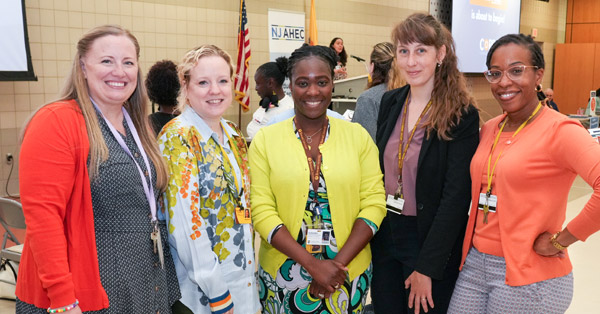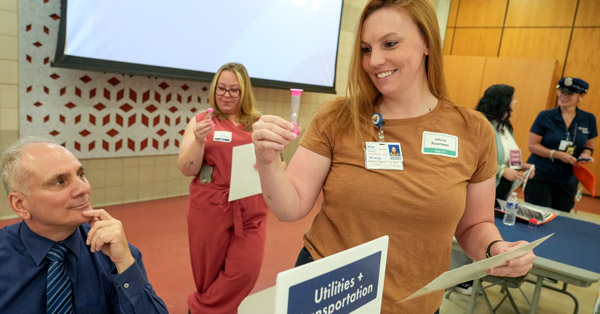AHEC Scholars experience poverty’s impacts through immersive simulation at Rowan-Virtua SOM
AHEC Scholars experience poverty’s impacts through immersive simulation at Rowan-Virtua SOM

New Jersey Area Health Education Center’s (AHEC) mission is to provide education and training to medical students and other health professionals with the goal of increasing the diversity and distribution of health professionals in underserved areas, and preparing those health professionals to deliver high quality, culturally competent care to vulnerable populations in a transforming health care system. The centers are spread throughout southern NJ in River (Burlington and Camden Counties), Garden (Cumberland and Salem Counties) and Shore (Atlantic County) divisions.
The program is a grant initiative funded by the Health Resources and Services Administration (HRSA) of the U.S. Department of Health and Human Services (HHS) designed to support the development of educational and training networks across communities and institutions.
Living the experience
This year, the NJ AHEC Scholars Conference at Rowan-Virtua School of Osteopathic Medicine introduced a new component to its curriculum: the Cost of Poverty Experience (COPE). Spearheaded collaboratively by the NJ AHEC program office and River AHEC, the event held on June 6 sought to help students understand the lived realities of those they are training to serve.
For Dr. Kristin Bertsch, NJ AHEC director and assistant professor at SOM, the goal of enhancing the quality and accessibility of health care in rural and underserved areas starts with ensuring participants grasp the realities faced by patients living in these medically underserved regions.
“We often talk about the social determinants of health, but we want students to feel the barriers many of their future patients face,” said Bertsch.
At the event, SOM Dean Richard Jermyn welcomed the participants gathered on the Stratford Campus and shared his own experiences navigating the systems at play as a child of immigrants in North Philadelphia. He stressed the importance of training for empathy and encouraged participants to put themselves in their patients’ shoes.
The COPE experience immerses students in a simulated community that includes the day-to-day needs of a typical citizen: health care, transportation, food, housing, education, employment and safety. Participants play the roles of community members trying to access food stamps, housing assistance or health care, only to face delays, denials, and unthinkable financial decisions. Resource stations staffed by faculty, students and community leaders mimic the real-life hurdles patients face daily, forcing scholar participants to confront the emotional, as well as financial, toll of poverty.
“We are proud to collaborate in advancing health equity through experiential learning,” said Yamilex Diaz-Fraction, Program Coordinator at River AHEC. “As certified facilitators of COPE, we have partnered to deliver this powerful simulation at Rowan-Virtua SOM, engaging AHEC Scholars, Virtua colleagues, and local community organizations. These events help participants gain firsthand insight into the
systemic challenges of poverty and reinforce our shared commitment to preparing compassionate, community-minded health professionals.”
Mission-aligned
Bertsch says this empathy-building experience aligns closely with Rowan-Virtua SOM’s mission to train students to embrace compassion and cultural competence as a lifelong commitment.
“Cultural competence can sometimes be misleading because it’s not like a mountain where you get to the top and you’re done,” Bertsch explained. “You must have humility and acknowledge that even if you come from a similar background, you may not fully understand their experience. You have to be willing to learn new information and acknowledge that, as physicians, we don’t always have all the answers.”
This year, 15 AHEC Scholars are participating in the pilot COPE experience. Bertsch hopes to eventually expand the program across all Rowan University campuses and beyond, to help students, faculty, and staff gain a deeper understanding of both the barriers and the resilience of underserved communities.
